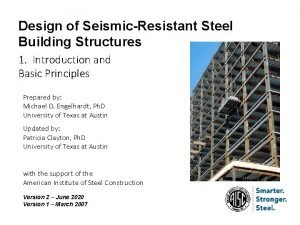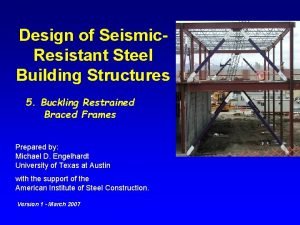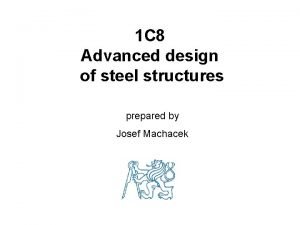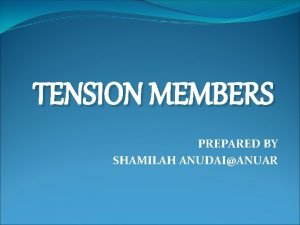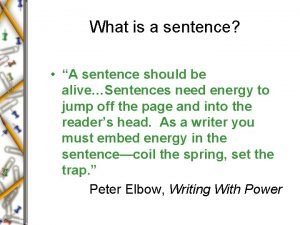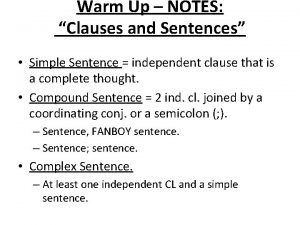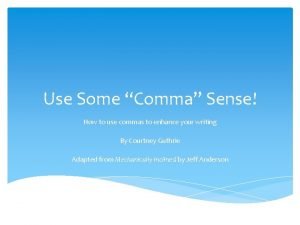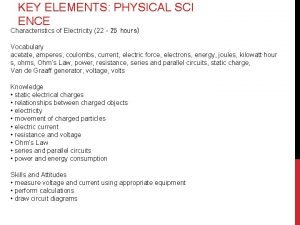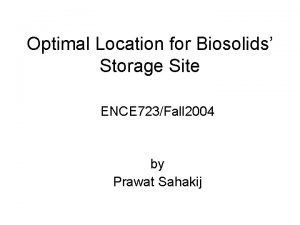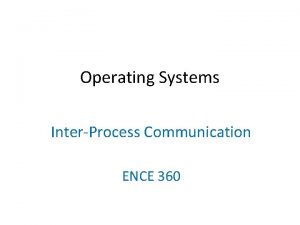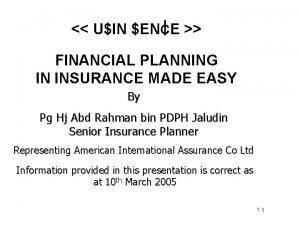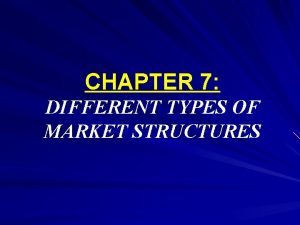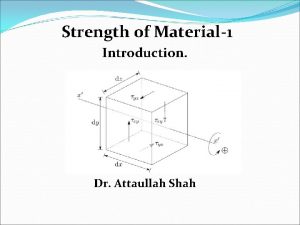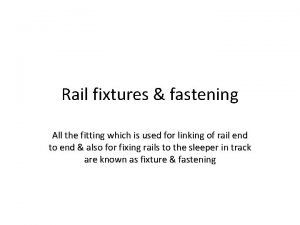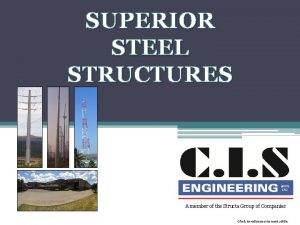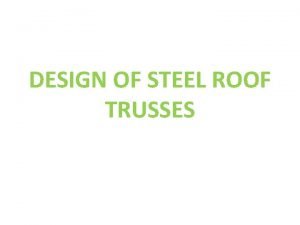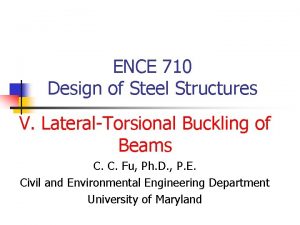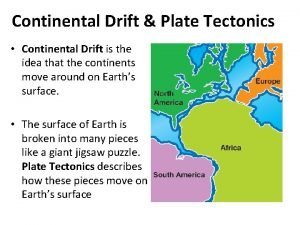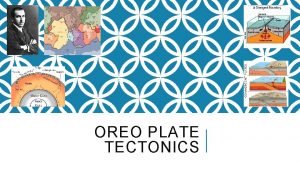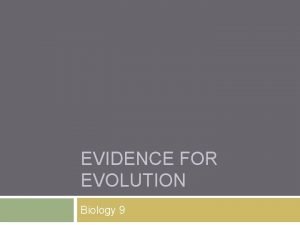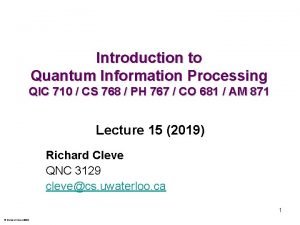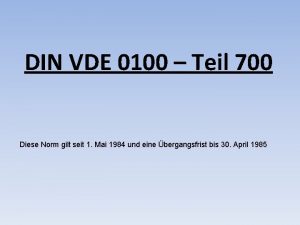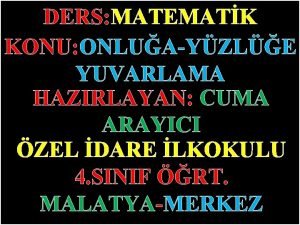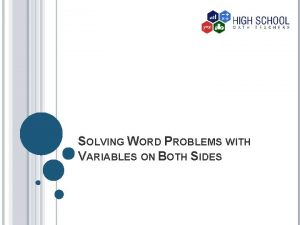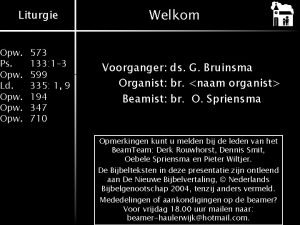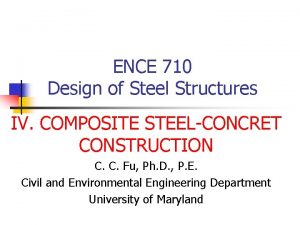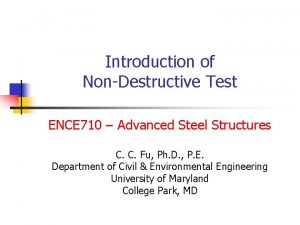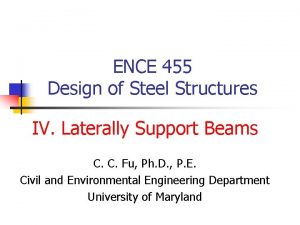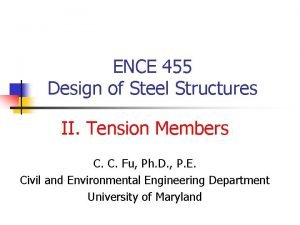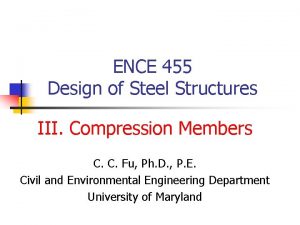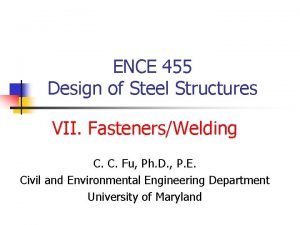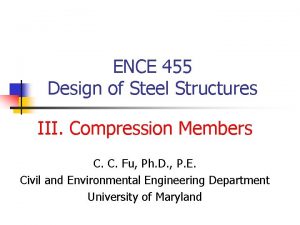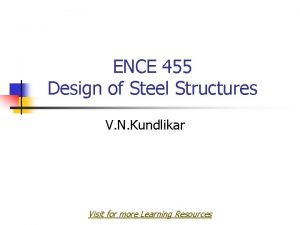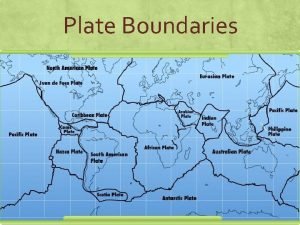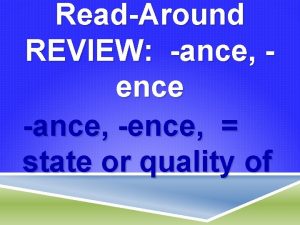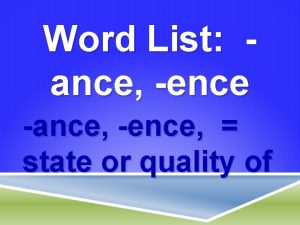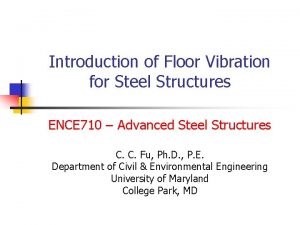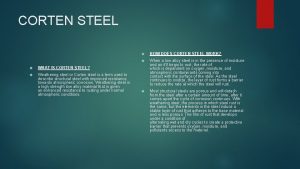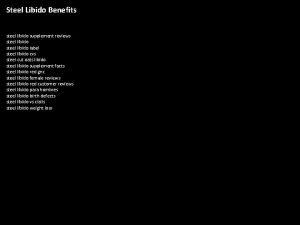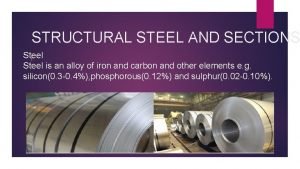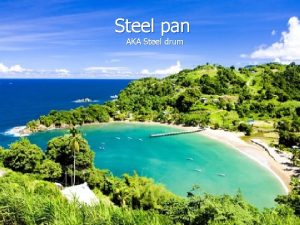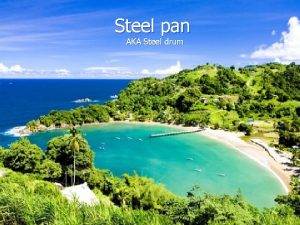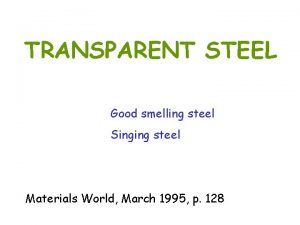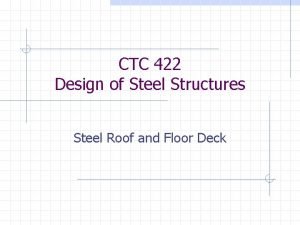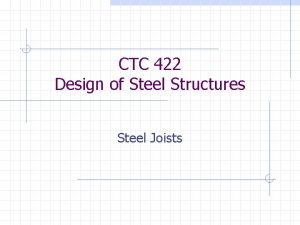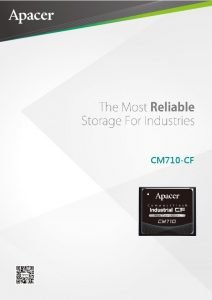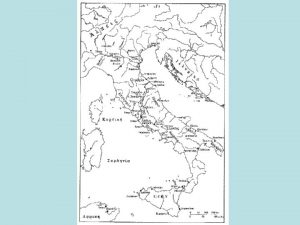ENCE 710 Design of Steel Structures VI Plate
































- Slides: 32

ENCE 710 Design of Steel Structures VI. Plate Girders C. C. Fu, Ph. D. , P. E. Civil and Environmental Engineering Department University of Maryland

Introduction Following subjects are covered: n Moment strength n Shear strength n Intermediate transverse stiffener n Bearing stiffener Reading: n Chapters 11 of Salmon & Johnson n AISC LRFD Specification Chapters B (Design Requirements) and F (Design of Members for Flexure) and G (Design of Members for Shear) 2

Typical Plate Girders 3

AISC Limiting Ratios 4

AISC Design of Members for Flexure (about Major Axis) 5

Beam vs Plate Girder: A deep beam “Slender” web problems: 1. Web buckling 2. Buckling of the compression flange due to inadequate stiffness of the web 3. Buckling due to shear (for doubly symmetric I-shaped sections) 6

Vertical Buckling (the compression flange) (a) Lateral buckling (b) Torsional buckling (c) Vertical buckling 7

AISC Maximum Web h/tw n n Stiffened girder (for a/h ≤ 1. 5) h/tw = 11. 7 √E/Fy (AISC-F 13. 3) Stiffened girder (for a/h > 1. 5) h/tw ≤ 0. 42 E/Fy (AISC-F 13. 4) (S & J Table 11. 3. 1) n Unstiffened girder h/tw ≤ 260 8

AISC Nominal Moment Strength n n If h/tw ≤ 5. 70√E/Fy – AISC Table B 4. 1 treated as rolled beams If h/tw > 5. 70√E/Fy n Case 1 – Compression flange yielding n Mn = Rpg. Fy. Sxc (F 5 -1) Mn = Rpg. Fcr. Sxc (a) Lp < L b ≤ Lr (F 5 -2) (F 5 -3) Case 2 – Lateral-Torsional Buckling (b) Lb > Lr (F 5 -4, 5, 6) (for WLB) aw = ratio of web area to compression flange area ( ≤ 10) hc = 2 x centroid to inside face of the compression flange 9

AISC Nominal Moment Strength (cont. ) n Case 3 - Compression flange local buckling Mn = Rpg. Fcr. Sxc Fcr a. λ ≤ λp: Fcr = Fy b. λ p < λ ≤ λr : (F 5 -7) (F 5 -8) c. λ > λr : kc = 4/√(h/tw) n and Case 4 – Tension-flange yielding (Sxt<Sxc) Mn = Rpt. Fy. Sxt (F 5 -9) 0. 35 ≤ kc ≤ 0. 763 (F 5 -10) 10

Limit States in Flexure for plate girder with slender web (AISC-F 5) 11

Comparison of LTB (AISC-F 5 with AISC-F 2) 12

Classical Shear Theory (applied to plate girder web panel) 13

Intermediate Stiffener Spacing 14

AISC Nominal Shear Strength n If h/tw ≤ 1. 10 √(kv. E/Fy) - Vn = 0. 6 Aw. Fy same as rolled beam n (G 3 -1) If h/tw > 1. 10 √(kv. E/Fy) (G 3 -2) Except (1) (2) (S & J Figs. 11. 8. 1 & 11. 8. 2) end panel a/h > 3 or a/h > [260/(h/tw)]2 15

AISC Nominal Shear Strength (cont. ) n For 1. 10 √(kv. E/Fy) ≤ h/tw ≤ 1. 37 √(kv. E/Fy) Cv = 1. 10 √(kv. E/Fy) / (h/tw) n (G 2 -4) For h/tw > 1. 37 √(kv. E/Fy) Cv = 1. 51 kv. E/[(h/tw)2 Fy] kv = 5 + 5/(a/h)2 5 (G 2 -5) if a/h ≤ 3 and [260/(h/tw)]2 otherwise (S & J Fig. 11. 8. 3) 16

Shear Capacity Available Figure 11. 8. 1 Shear capacity available, considering post-buckling strength. 17

Tension-Field Action. Figure 11. 8. 2 Tension-field action. 18

Buckling of Plate Girder Web Figure 11. 7. 3 Buckling of plate girder web resulting from shear alone —AISC-G 2 19

Forces from Tension-Field 20

Force in Stiffener (resulting from tension-field action) 21

State of Stress 22

Intermediate Transverse Stiffeners (at nominal shear strength Vn including tension-field action) 23

Shear and Moment Strengths (under combined bending and shear) 24

Intermediate Transverse Stiffeners Intermediate Transverse Stiffener (not required if h/tw ≤ 2. 45√E/Fy) (1) Stiffness Criterion Ist ≥ jatw 3 (G 2 -6) where j = 2. 5/(a/h)2 – 2 ≥ 0. 5 n (2) Strength Criterion n Ast > Fy/Fyst (0. 15 Dshtw (1 – Cv) Vu/Φv. Vn – 18 tw 2)≤ 0 (G 3 -3) 25

Intermediate Transverse Stiffener connection to flange 26

Bearing Stiffener (effective cross-sections) 27

Bearing Stiffener ΦRn ≥ Ru (1) Bearing Criterion (LRFD – J 8. 1) Φ = 0. 75 Rn= 1. 8 Fy. Apb (2) Column Stability Criterion KL/r = 0. 75 h/r where r of 12 tw or 25 tw Φc. Fcr = LRFD Table 3 -36 Reqd. Ast = Ru/Φc. Fcr → Reqd. t (3) Local Buckling Criterion (AISC 13 th Edition Table B 4. 1 Case 3) Min. t = w/(0. 56/√E/Fy) 28

Effect of Longitudinal Stiffener on plate girder web stability 29

Example – Girder loading and support for design 30

Example Factored moment and factored shear envelopes for two-span continuous beam of illustrative example 31

Example - Design Sketch 32
 Aisc
Aisc Design of seismic-resistant steel building structures
Design of seismic-resistant steel building structures Advanced design of steel structures notes
Advanced design of steel structures notes Mode of failure in tension member
Mode of failure in tension member What is sentence
What is sentence Sentences from before
Sentences from before Sent interrupter ence example
Sent interrupter ence example Ence electric
Ence electric Ence storage
Ence storage Ence360
Ence360 Easy for ence
Easy for ence Monopolistic competition example
Monopolistic competition example Anchor plate in steel structure
Anchor plate in steel structure A 12 inches square steel bearing plate
A 12 inches square steel bearing plate Fixtures and fastenings in railway
Fixtures and fastenings in railway Superior steel structures
Superior steel structures Design of trusses
Design of trusses Types of connections in steel structures
Types of connections in steel structures Steel structures
Steel structures Pour plate method vs spread plate method
Pour plate method vs spread plate method Isolation and preservation of pure culture
Isolation and preservation of pure culture Chapter 6 microbial nutrition and growth
Chapter 6 microbial nutrition and growth 7 lithospheric plates
7 lithospheric plates V
V Homologous structures examples
Homologous structures examples Da form 2062
Da form 2062 Qic 710
Qic 710 Vde 0100 701
Vde 0100 701 450 hangi yüzlüğe yuvarlanır
450 hangi yüzlüğe yuvarlanır Ortec 710
Ortec 710 A gas has a pressure of 710 kpa at 227
A gas has a pressure of 710 kpa at 227 Equations with variables on both sides word problems
Equations with variables on both sides word problems Opw 710
Opw 710
